The Pros and Cons of a Crushed Concrete Driveway
Crushed concrete is a popular driveway paving option for many homeowners. Similar to gravel, crushed concrete is made up of tiny little pieces of concrete that have been ground and crushed to create a material suitable for paving.

There are many reasons why a person might want to use crushed concrete in their driveway, but also some reasons why you might want to stay away from it as well. In case you’re interested in this common paving material, let’s go over some crushed concrete driveway pros and cons.
Where Does Crushed Concrete Come From?
When concrete is demolished, it can either be put in a landfill to sit there forever, or it can be recycled. Concrete is not biodegradable so in order to get the most use out of it, it needs to be recycled. Demolished concrete is sent to a recycling plant where it can be further crushed, cleaned of impurities, and eventually made suitable for reuse.

It can be added in as a supplement when making new concrete, or it can be crushed and sold in the same way that loose gravel is. The crushed concrete you would buy for a driveway is recycled from old pavement projects.
What are the Benefits of Using Crushed Concrete for a Driveway?
Price is the main upside to using this crushed concrete. Since it is a recycled material, it costs much less than having fresh concrete poured. It’s also much more affordable than natural stones.
Eco-friendliness is another big benefit of crushed concrete. Using this material helps slow down the production of new concrete and also frees up space in landfills. It prevents demolished concrete from sitting around taking up space and puts it to good use.
Depending on how you have it installed, it’s also rather permeable. This helps with the flow of stormwater and puts less of a burden on local storm systems. This material is also known for being versatile and can be used in conjunction with other paving materials.
For example, if you like the look of natural stones or fresh concrete, you can use crushed concrete to create the base for your driveway, installing your preferred surface materials on top. This uses less expensive material and still adds some permeability to your driveway, depending on how it’s designed.
There are many types of crushed concrete that are suitable for a variety of different uses. For driveways, however, 21AA crushed asphalt, 21AA crushed concrete, and 22AA crushed concrete are the only suitable options for building a driveway surface. There are others that can be used for a sub-base as well.
What are the Downsides to Using Crushed Concrete in a Driveway?
Durability is the main concern. Unstabilized, loose crushed concrete has all the downsides that loose gravel does. It spreads and thins easily, requiring you to add more and to constantly even out your driveway so it doesn’t develop bare spots and ruts.
Crushed concrete also creates dust rather easily, which can stick to your vehicles and dirty them. The permeability of an unstabilized crushed concrete driveway is also much less than that of one stabilized with pavers.
What’s the Best Way to Use Crushed Concrete for Your Driveway?

The best way to use this material for a driveway is to stabilize it with porous pavements. TRUEGRID, for example, makes plastic pavers that interlock together and contain the crushed concrete inside. The TRUEGRID PRO LITE and TRUEGRID PRO PLUS paving systems are perfect for stabilizing your crushed concrete and creating a durable, level driving surface that never thins or spreads.
The installation process for building a crushed concrete driveway with TRUEGRID pavers is also incredibly simple and fast. First, your driveway must be excavated to a depth of 6 to 8 inches, and a piece of fabric will be laid at the bottom to prevent concrete migration into the soil and also serve as a weed block.
Then, crushed concrete will be poured into the excavated area and compacted, filling it to the brim. Next, the empty pavers will be snapped into place over the top of the filled pit. Afterwards, more crushed concrete will be poured into the paver cells and compacted into the empty cells of the pavers. This weighs the pavers down and prevents them from moving.

The main benefit to using TRUEGRID pavers for your crushed concrete is the durability and low maintenance requirements of the pavers. They can last 60 years with almost no maintenance, allowing you to enjoy a crushed concrete driveway without any of the hassle so many others face when using unstabilized crushed concrete.
Let TRUEGRID Help You Get the Most Out of Your Crushed Concrete Driveway
If you want to maximize the benefits and eliminate the drawback of using crushed concrete to build a driveway, look no further than TRUEGRID permeable plastic pavers. If you’re interested in a beautiful driveway that stands the test of time and prevents flooding as well, contact TRUEGRID today to get in touch with a pavement professional for a quote.
Sometimes one driveway isn’t enough. Maybe you’ve just purchased a new vehicle for yourself or one of your loved ones, or maybe you’ve just bought a new toy that you want to park outside.
Instead of having to park your extra vehicle in the yard, on the side of the road, or somewhere else not fit for parking, why not just add some space to your driveway? Adding a parking pad to a driveway is incredibly easy and affordable, especially if you choose a certain type of paving.

However, there are many options for adding a parking pad to your driveway, so in case you’re interested, let’s inspect them all and look at which paving option is easiest to add.
Material Options for a Driveway Expansion
There are a wide variety of materials you could use to expand your driveway and add an additional parking space. Depending on what your driveway is made out of, there’s a good chance you’ll want to simply use the same material for your extension. Gravel, pavers, and concrete are the three most common paving materials for driveway expansions, so let’s go over the pros and cons of each.
Concrete is one of the most expensive materials for adding parking space driveway additions. Not only is the material itself more expensive than, say, gravel. The labor associated with concrete installations is far more expensive because the work is harder and it takes much longer to complete.
Assuming you won’t be performing the installation yourself, concrete will cost you anywhere from $8 – $18 per square foot to install. Using decorative colors and/or finishes will put you on the higher end of the price scale. The installation will take anywhere from 1-3 days.
Pavers are another option for a driveway expansion. There are many different types of pavers and the price and installation time can vary greatly. Natural stone pavers like cobblestone, for instance, can cost you as high as $75 per square foot for installation. Pavers can be expensive, but they are highly durable and stylish as well.
Brick pavers, on the other hand, are not as durable, but they cost less. They will cost anywhere from $10 – $17 to install, but need to be resealed periodically. Interlocking concrete pavers and most other types of concrete pavers will cost about $7 – $20 to install, depending on the intricacy of the design.
Gravel is by far the cheapest way to add a parking pad to driveway design plans. Loose gravel costs next to nothing and needs only be spread evenly over the desired parking area. Of course, loose gravel has many drawbacks as well.
It easily spreads, creating bare spots which can lead to ruts and mud holes. It also gets ground into fine dust over time, dirtying your vehicles faster. Loose gravel doesn’t have the best traction, which can be a problem if you have a sloped driveway.
The Best Material to Add a Parking Pad
If you want to know what the best option is for adding a parking pad to your driveway, the answer is permeable pavement. TRUEGRID permeable pavers, for example, look just as clean and beautiful as any other paving material.
They utilize gravel-stabilization grids to provide a level, sturdy surface with plenty of traction for even the steepest of driveways. They can be installed in any soil or climate and wont heave or crack like other options. TRUEGRID PRO LITE and TRUEGRID PRO PLUS are both excellent options if you’re concerned about flooding, since they’re 100% permeable.

The installation process is quick and involves excavating the new parking space to a depth of about 6 to 8 inches, deeper if more drainage and stormwater storage is needed. Next, a piece of cloth is laid at the bottom of the excavation to keep subgrade and gravel seperation and block weed growth from below. Then, the area is filled with gravel and compacted.
Afterward, the empty pavers are snapped together in place over the gravel pit, and more gravel is poured into the top. Once the surface gravel has been compacted into the empty paver cells, the installation is complete. The entire process takes less than a day in most cases.

There’s also TRUEGRID ROOT for those who just want to stabilize a grass area for parking without any excavation or gravel. These pavers can be simply pressed into the grass for increased stabilization and traction, preventing your grass from being torn up by vehicle traffic. Your grass will grow up through them, making the pavers nearly invisible.

TRUEGRID Pavers Outperform Other Driveway Parking Pad Materials
If you want a new parking pad done right, you can’t go wrong with TRUEGRID permeable plastic pavers. They are durable enough to last 60 years with almost zero maintenance, eco-friendly, quick to install, cost-effective, and stylish.
If you want a brand new parking pad added to your driveway that’s going to stand the test of time, don’t hesitate to get in touch with a pavement professional at TRUEGRID today.
If you’re looking for new driveway options, cobble effect paving is a popular choice. Cobblestone has been used throughout history as a paving material for walkways, driveways, patios, and more.
This unique paving material has a wide variety of pros and cons to consider, so in case you’re interested in cobblestone paving, let’s go over some of the benefits and drawbacks of using cobblestone pavers.
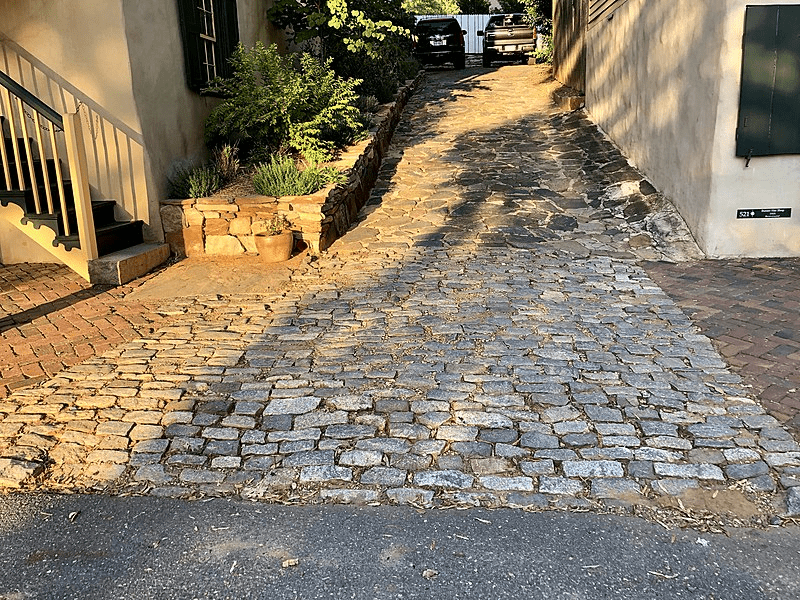
What is Cobblestone?
The term cobblestone has come to mean a couple of different things in today’s world, but its true meaning refers to small natural stones used for paving. They are usually granite, but can be made up of other stones or a combination of stones like basalt, limestone, or other natural stones.
Some paving companies will refer to their concrete bricks as cobblestones but this is informal, as concrete is not a natural stone even though it can be used to create pavers that look like cobblestone.
Cobble block paving is used mostly for its aesthetic charm. A cobble effect driveway has a unique look that many find attractive. This is the main reason why a person might choose cobblestone in a debate, as the natural stones look more authentic than engineered brick.
Of course, some choose to opt for a combination cobblestone brick driveway with both materials used to complement each other. A fake cobblestone driveway is also an option for those who don’t want to pay for real stones.
Paving cobblestones are usually round in shape, though the term cobblestone has come to encompass any natural paving stone. There is a type of cobble paving that uses shaped blocks, however. These cobblestone brick pavers are called Belgian blocks and are more uniform in size and shape, giving them the advantage of being easier to install than round cobblestone pavers.
Pros of Using Cobblestone Pavement
One of the reasons people love cobblestone so much is its durability. Natural cobblestone pavers used in cobblestone block paving have been used to build roads that have lasted for centuries.
Cobblestone-look pavers are also naturally beautiful and have a unique, old-world charm about them. This is why many people choose to build a cobbled driveway or a small walkway with curved cobblestone pavers.
In fact, for those who just like the aesthetic, cobblestone pavers can be used in conjunction with concrete, asphalt, permeable pavement, and other types of material to create a hybrid cobblestone concrete driveway or another type of modern cobblestone driveway. A cobblestone driveway also requires little maintenance, except for a weed-pulling and a spray-down every once in a while.
Cons of Using Cobblestone Pavement
The main drawback to using cobblestone driveway pavers is the cost per square foot. The cobblestone cost per square foot is anywhere from $10 – $20, depending on the size, shape, and type of cobblestone.
If you plan on building a granite cobblestone driveway on your own, the DIY cost will run you another $10 per square foot, on top of the materials cost. But, if you’re having a cobblestone installation done by professionals, you can expect the cobblestone cost to total out anywhere from $40 – $75 per square foot.
If you’re wondering how much is cobblestone when compared to other common materials, it ranks among the most expensive. The cost is a fair bit more expensive, though you can make up some of that with the low cobblestone maintenance costs over time.
The cobblestone cost can vary a bit as well, especially if you use sand or mortar in between the stones. Mortar can crack and need to be reapplied, while sand can erode away and need to be replaced as well. Both of these materials will drive up the price a bit.
Is There a Better Alternative to Cobblestone?
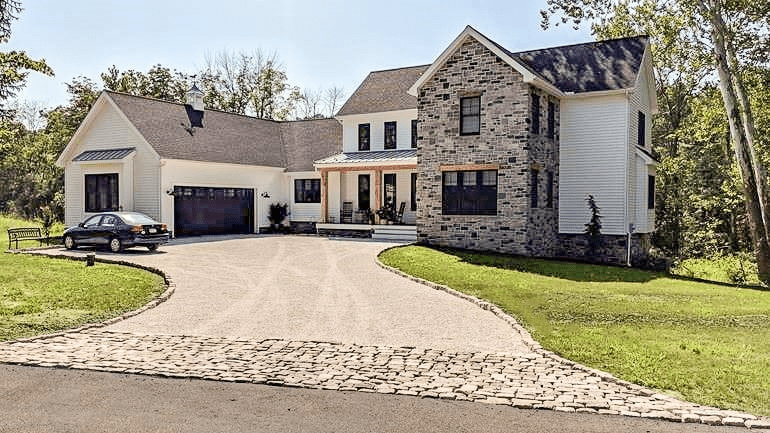
Yes, TRUEGRID permeable pavement is a superior paving option to cobblestone. Able to handle multiple colors and styles of gravel, TRUEGRID PRO LITE and TRUEGRID PRO PLUS pavers are just as stylistically diverse and appealing as natural cobblestone. They can also be used in conjunction with cobblestone to create a semi-permeable driveway with natural stone elements.
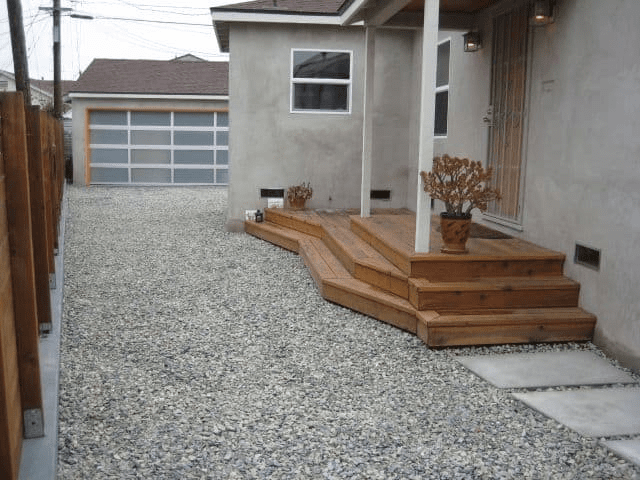
A TRUEGRID permeable pavement driveway utilizes plastic pavers filled with crushed stone to create a 98%-permeable, level, and durable driving surface. TRUEGRID pavers are some of the most eco-friendly on the market and require almost zero maintenance over their 60-year lifespan.
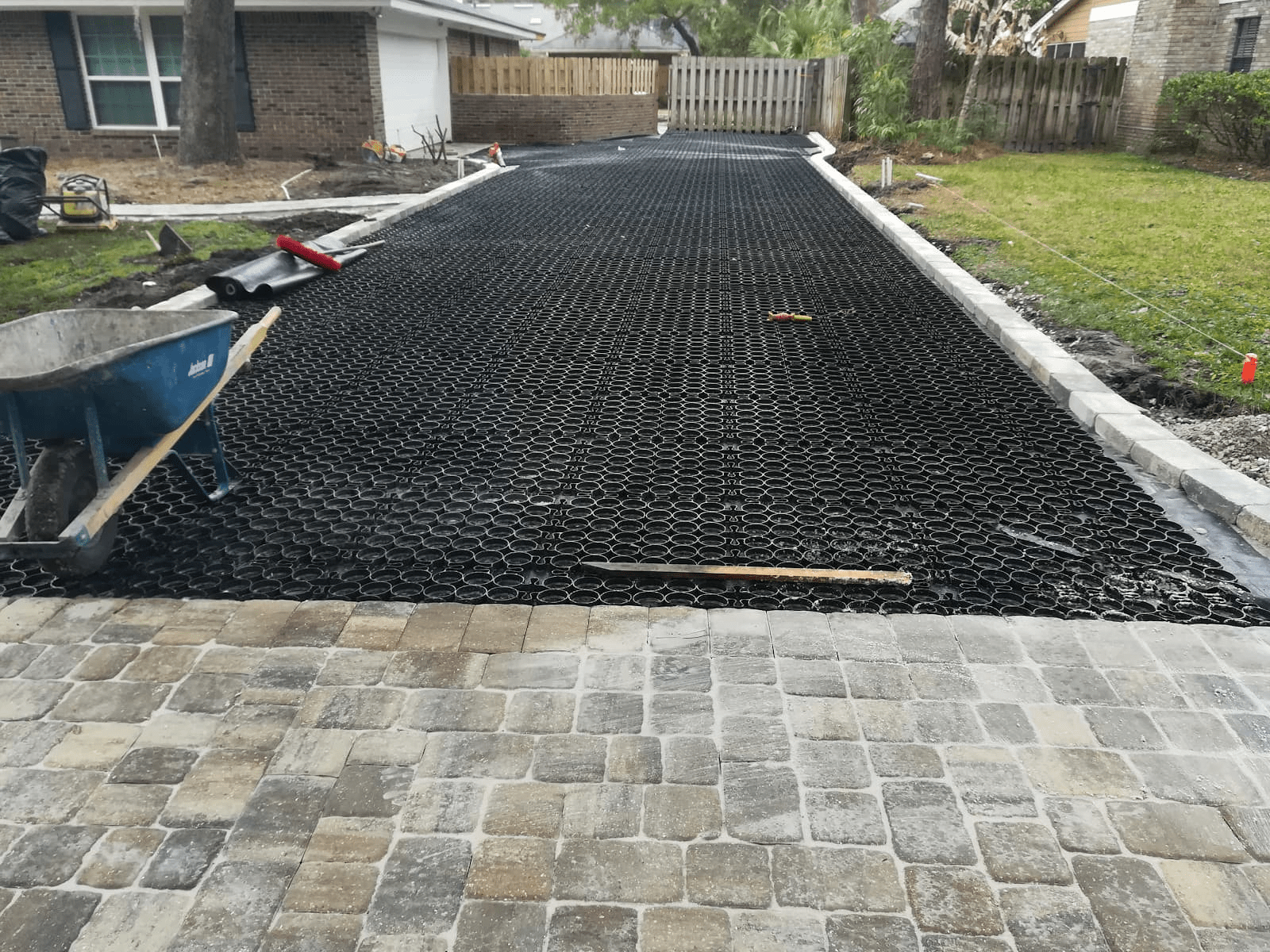
The installation process for a driveway made from TRUEGRID permeable pavers is also much quicker than cobblestone, with some installations being completed in as little as a single day. If you want a paving material that’s more affordable, stylistically diverse, and durable than cobblestone, contact a pavement professional at TRUEGRID today for a quote.
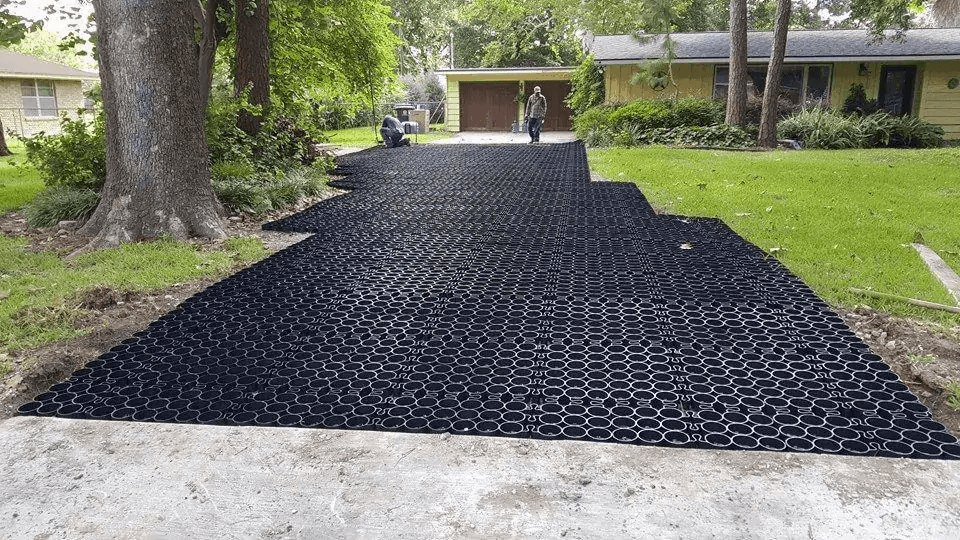
Permeable pavement has been increasing in popularity for some time now. Permeable pavers are the preferred pavement options for both residential and commercial uses because of how they facilitate the flow of rainwater directly through them.
Porous pavements reduce the possibility of flooding and also eliminate the need for additional drainage systems in most cases. They’re often made of eco-friendly material like recycled plastic, but can be found in many other varieties as well.
In case you’re interested in learning all about how much this type of pavement costs and what the best permeable pavement option is, let’s take a deeper look at the cost of permeable pavers.
What are Permeable Pavers?
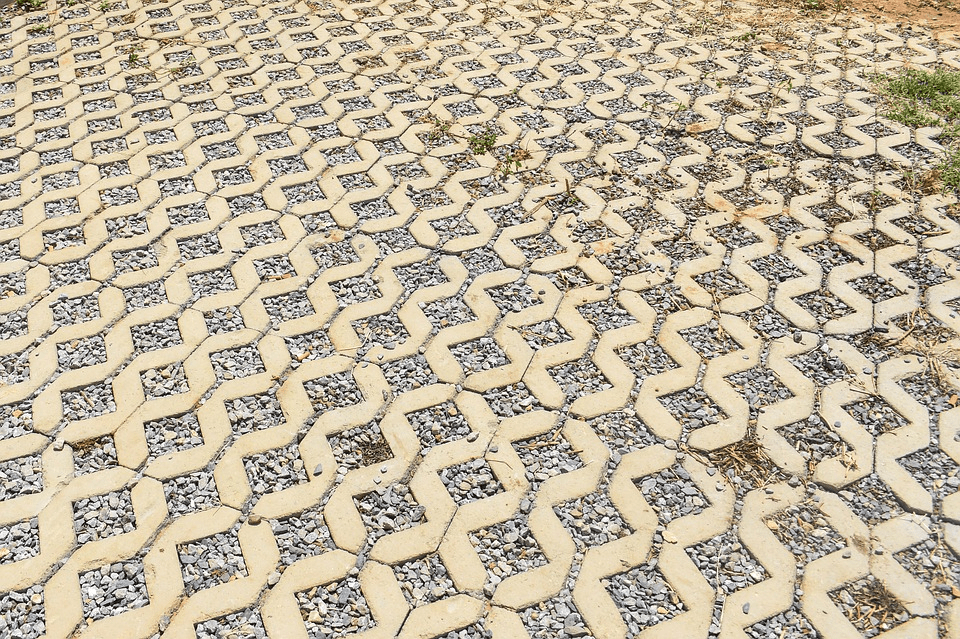
Pervious pavement usually refers to pervious concrete and pervious asphalt. These types of pavement have voids inside them that allow some water to drain through, but are not as effective at stormwater management as completely permeable pavement.
Permeable pavement usually refers to products like permeable pavers. Permeable pavers can come in all shapes and sizes. Natural stone pavers can be installed in a way that allows water to pass through the cracks in between each paver.
The cost of permeable pavers is much higher than plastic grid-style pavers and there is a bit more stylistic flexibility because of how you can arrange brick and/or stone pavers, and the material itself costs more than the filler used for plastic permeable pavers. These stone pavers are used mostly in small decorative areas.
Plastic permeable pavers cost less than stone and brick pavers and are more durable as well. The permeable pavers driveway cost versus concrete driveway cost is fairly lopsided, and similar when comparing permeable plastic pavers and asphalt, with the pavers being much cheaper.
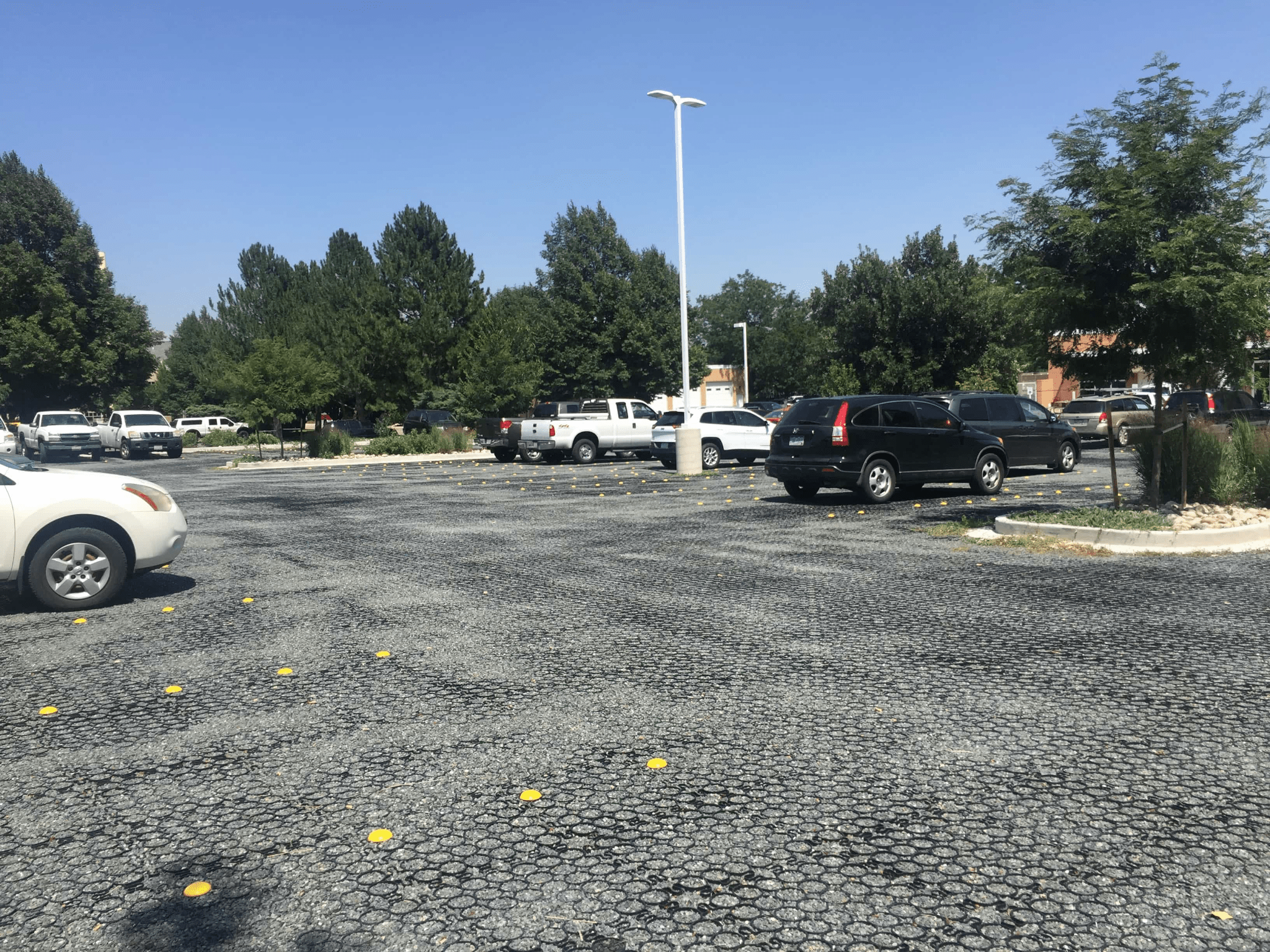
Top-quality plastic pavers like the TRUEGRID PRO LITE, and TRUEGRID PRO PLUS systems are the best-performing permeable pavers on the market, lasting over 60 years with minimal maintenance required.
They’re also made from 100%-recycled plastic and are one of the most eco-friendly paving options available. Plastic pavers benefit from quick installation times and low maintenance requirements.They also imporatntly have the highest rainwater drainage rate at over 1000 inches per hour.
Comparing Costs of Permeable Pavers
Factoring in installation costs, a porous asphalt driveway cost is about $7 – $13 per square foot. A pervious concrete driveway cost is anywhere from $8 – $16 per square foot. Permeable interlocking concrete pavers cost about $4 – $12 per square foot, and the permeable concrete block paving cost is identical to that. The permeable concrete cost refers to concrete pavers whereas pervious concrete refers to solid concrete with voids in it.
The permeable pavement cost comparison of natural stone pavers has them priced more expensively than any other material, at $10 – $30 per square foot. When it comes to grass pavers like the TRUEGRID ROOT system, the permeable pavement cost is about $3 – $9 per square foot.
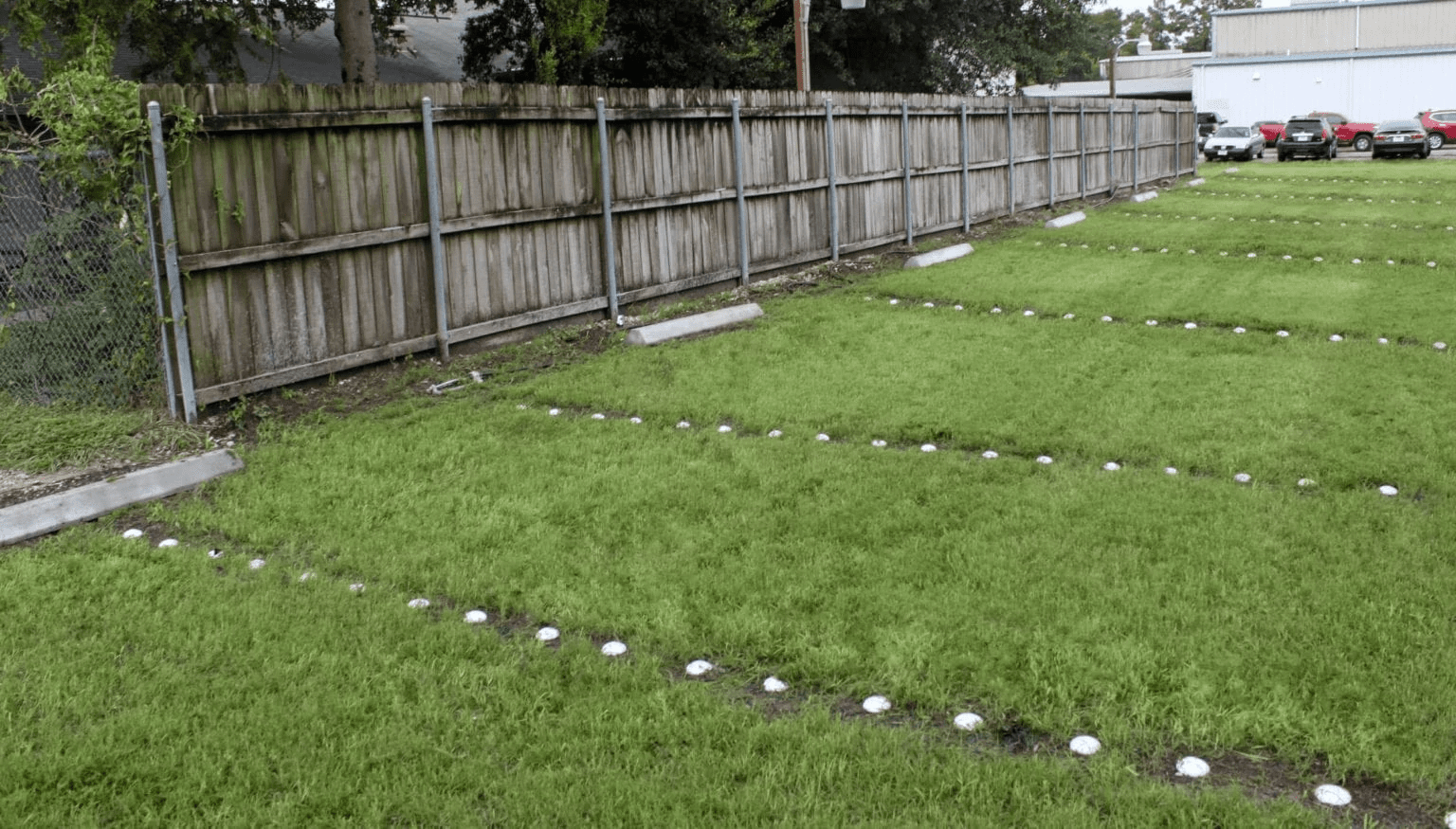
Gravel filler for permeable pavers costs about $1 – $3 per square foot, while sand fill costs about $25 – $45 per ton. Sod for grass pavers costs about 30 – 40 cents per square foot.
What is the Best Type of Permeable Pavement?
The best type of permeable pavement depends on a few things. If you have a preference for pervious concrete or asphalt then you might be more willing to pay the pervious driveway cost or pervious paving cost of this material. If porous asphalt is more your thing, then the permeable asphalt driveway cost will be worth it for you. Just know that there will cracks and maintenance in your near future.
If you like a gravel or grass look without the headaches and you want the best material possible, permeable plastic pavers from TRUEGRID are the best choice.
They have their own aesthetic appeal and charm thanks to the sleek, clean-cut look of the pavers combined with one or more types of gravel, and they perform better in every category.
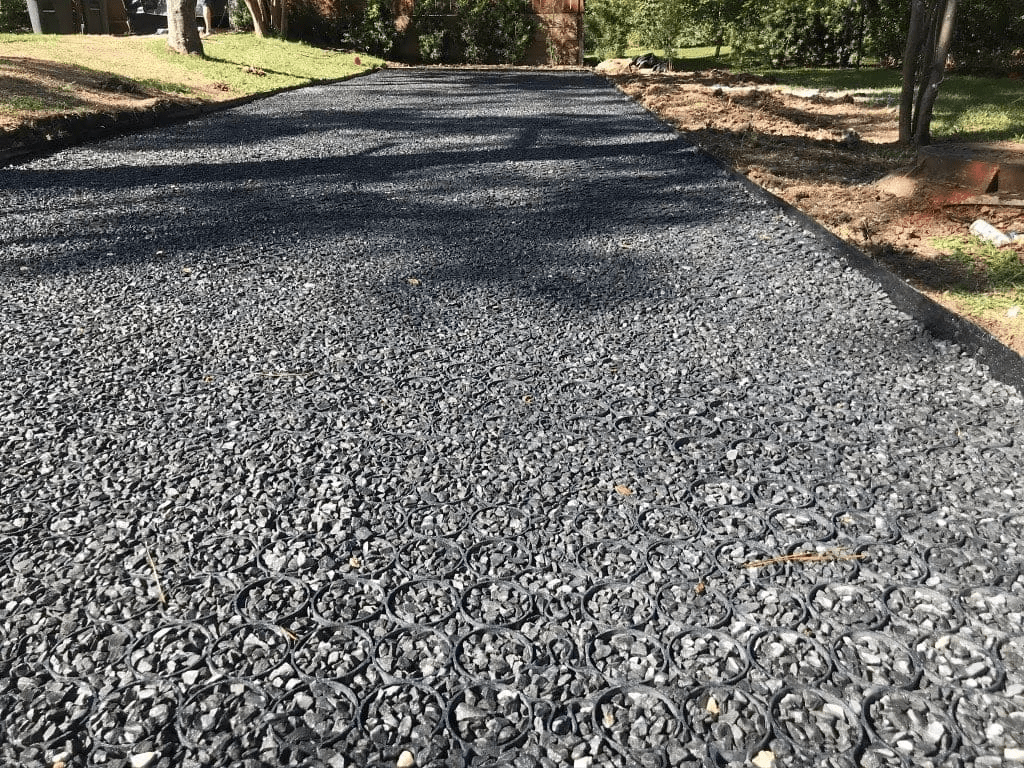
A permeable paver driveway from TRUEGRID can be installed in as little as one day, and will be completed much faster than a concrete or asphalt driveway. When it comes to permeability, TRUEGRID stands above the rest.
TRUEGRID pavers are 100% permeable and able to handle even the heaviest of rainstorms with ease. Compared to interlocking concrete pavers, brick pavers, and/or permeable stone pavement, TRUEGRID pavers are far more permeable.
TRUEGRID Permeable Pavement is Stylish, Durable, and Affordable
If you want permeable pavement that isn’t going to break the bank but will still perform well, look no further than TRUEGRID permeable pavers. They are incredibly eco-friendly, durable enough to last 60 years with almost no maintenance, and stylistically diverse as well. When you tally up the pros and cons of each permeable paving material, it’s not hard to see that TRUEGRID stands above the rest. If you want the best permeable pavement option on the market, don’t hesitate to contact TRUEGRID today for a quote.

